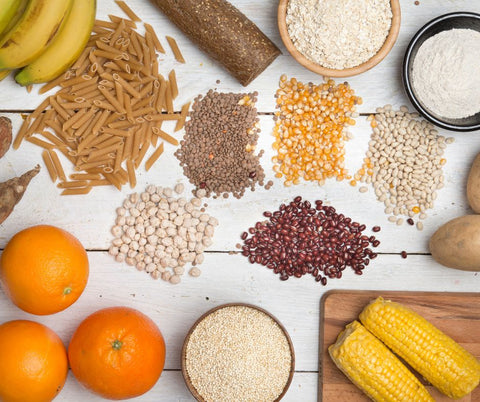Common Weight Loss Myths
Common Weight Loss Myths
By Julie Campbell
With summer only a couple months away, people start to think more about their weight. It’s the same thoughts that goes through everyone’s mind this time of year, “Oh no, I’ll have to be in a bathing suit soon,” or “I need to shed my winter weight.” It’s natural to have these feelings of apprehension as we start to swap pants for shorts, and sweaters for tank tops. If you’re in the mindset of wanting to “slim down for summer” (albeit NOT a requirement for this season), we want to debunk some weight loss myths that people often buy into
Myth #1: Carbs are evil

Carbs are not evil, in fact, they’re essential. Carbohydrates provide the body with glucose, which is our body’s primary source of energy. Glucose fuels our brain, kidneys, heart muscles, and central nervous system. We need carbohydrates for our bodies to function properly. Some of the healthiest food choices are carbohydrates like fruits, vegetables, and whole grains. It seems like carbohydrates get a bad rap because of the less nutritious forms of carbohydrates like white bread, baked goods, and processed snacks, but even those are okay to have occasionally.
Myth #2: Quick change means it’s working

Crash dieting and losing weight quickly does not work. We live in a world where we all want instant gratification, but it does not happen that way with our bodies. If we want long-lasting change, it’s the small improvements that will get us there. People with a gradual and steady weight loss of 1-2 pounds per week are more likely to keep their weight off. And when it comes to fad diets or cleanses, ask yourself whether you could maintain it for a long period of time, if the answer is no, then it is likely not the best method for long-term weight loss.
Myth #3: It’s all about willpower

“I wish I had the willpower.” We’ve all heard this sentence or have said it ourselves. The truth is it has nothing to do with willpower. The body’s main objective is to keep us alive. If we’re dieting and cutting calories, we’re hungry and our body goes into survival mode. Our body doesn’t realize we’re dieting, it thinks food is no longer available, so it slows the metabolism and at the same time it’s urging us to find food and eat that food! The human body is miraculous. If we’re having intense cravings, then it’s our bodies telling us something.
Myth #4: The scale knows best

Just because the number on the scale isn’t moving doesn’t mean you’re not making progress. There are other markers of success like how your clothes fit, your energy levels, and your muscle definition. You could be losing fat while at the same time gaining muscle, and the scale won’t tell you that. The scale can still be used as a data point, but it does not have to be the data point.
Myth #5: Eat less to lose weight

The key isn’t to eat less, it’s to eat more food but less calories. Nutrient dense foods are foods that are high in nutrients but low in calories. Nutrient dense foods are the same foods that provide us with adequate vitamins and minerals - complex carbohydrates, fruits, vegetables, lean proteins, nuts, beans, and eggs. These foods are relatively low in calories but also incredibly filling. Research has shown that people get full by the amount of food they eat, not by the amount of calories they take in. So instead of restricting yourself, add in nutrient dense foods to fill up your plate.
Myth #6: I only need to focus on my diet

How we nourish our bodies is just one piece of the puzzle. It’s also about our sleep, our stress levels, our emotional health, our activity levels, and certain conditions or medications. It’s about our overall lifestyle and taking care of ourselves in each aspect of our life. And most importantly, it’s about how we feel. If you’re feeling happy and energized, then you’re already doing something right.
